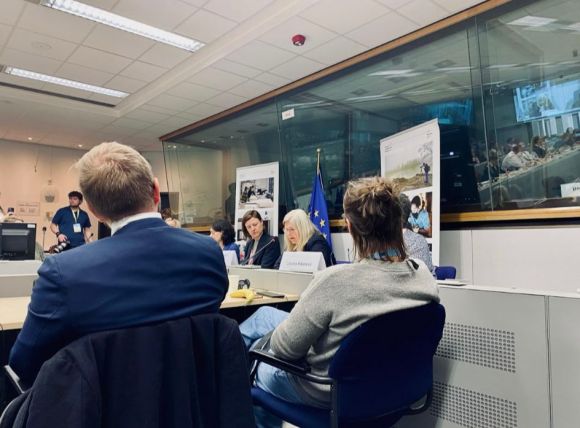
Ragna Fidjestøl, Director of EEA and Norway Grants: “Civil societies encourage a healthy public debate, addressing democratic values and inequalities. Therefore, vibrant civil societies are crucial for healthy democracies.” Picture: Hanna Öllös.
The workshop "Every Voice Matters: Experiences in Citizen Engagement at Local Level," part of the 2024 European Week of Regions and Cities, highlighted initiatives supporting democracy and civil participation across Europe. It focused on EU-funded programs like the Citizens, Equality, Rights, and Values (CERV) Programme and the Active Citizens Fund (ACF) by the EEA and Norway Grants. The event showcased efforts, featuring case studies from Bulgaria and Poland, aimed at empowering civil society and marginalised communities.
Supporting grassroots initiatives
Moderated by Valeria Setti from the European Commission, the session kicked off with an introduction to CERV by Maria Tomassetti. CERV is the largest EU fund (1.56 billion from 2021 to 2027) allocated to promote democracy and fundamental rights through supporting civil society organisations (CSOs) on the basis of four pillars: human dignity, human rights, citizen engagement and gender-based violence prevention. Tomassetti emphasised that supporting grassroots organisations is key to promoting these values, especially those focused on democracy and human rights. By targeting small organisations with limited resources, the program enables local players to implement projects at the community level.
Ragna Fidjestøl, Director of EEA and Norway Grants, then continued by introducing the Active Citizens Fund, which supports CSOs in fourteen European countries. The fund, worth €250 million, has also been instrumental in promoting democratic values, fostering civil participation, and addressing inequalities in society. Fidjestøl explained that a portion of the grants is specifically designated for capacity building and democracy promotion.
“The Active Citizens Fund aims at strengthening civil society and empowering disadvantaged communities. Our aim is to help particularly the newly joined member states in integration. Civil societies encourage a healthy public debate, addressing democratic values and inequalities. Therefore, vibrant civil societies are crucial for healthy democracies.”
Ragna Fidjestøl
Challenges for civil society organisations
Speakers acknowledged the challenges CSOs face. In Bulgaria, Iliyana Nikolova noted that while over 20,000 CSOs are registered, many are concentrated around the capital, leaving regions like northwestern Bulgaria underrepresented. She pointed out that these organisations often struggle with insufficient funding, political interference, and limited capacity. Similarly, in Poland, Magdalena Krasowska described financial hardships and "activist burnout" as key issues, stemming from dependency on grants and complex relations with regional governments.
“Rural areas tend to be more conservative. CSOs are often perceived as those who undermine authority, and at the same time for many people, democracy and human rights are just a figure of speech, but they don’t understand the real meaning of these words. Our programme aims to build more self-agency, empower communities and bring them out of learned passivity and learned helplessness,” Magdalena Krasowska explained.
Looking ahead
Despite the challenges, inspiring projects funded by CERV and ACF were highlighted. In Poland, a legislative theatre project used drama to promote democratic engagement. Other projects focused on LGBTQ+ rights and domestic violence in schools. In Bulgaria, a unique initiative fostered collaboration between Roma organisations and local authorities to combat discrimination.
The session was brought to a closing by looking into future directions for civil society funding. As Fidjestøl noted, a new Civil Society Fund will soon be introduced, which will not only have a strong focus on democracy and media literacy, but will also bring environmental protection and green transition into the picture. Tomassetti stressed the need for less bureaucracy to allow smaller organisations to keep up.
“To decision-makers, I’d emphasise that the size of the organisation isn’t as important as its potential to create change. Community-building programs rely on investing in organisations and building their capacities,” Krasowska concluded.
By Nick Vink and Hanna Öllös



